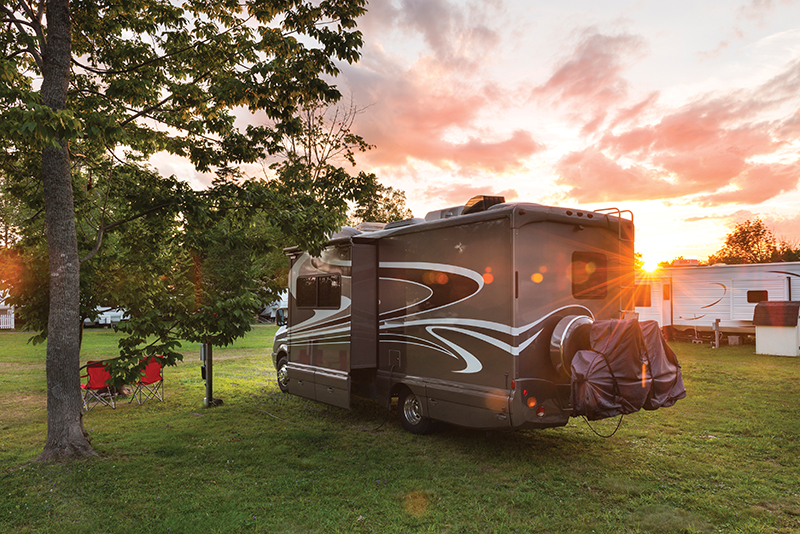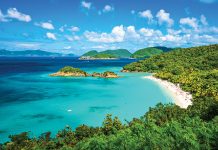
Retired General Motors engineer Jim Blenman and his wife, Martha Blenman, live in Grosse Pointe Woods, but they breathe Up North. The Blenmans own a parcel of land outside Traverse City near Crystal Lake and, after testing out several recreational vehicles, recently purchased a 26-foot Grand Design Imagine travel trailer in which to reside upon it. “It’s all the comforts of home in a confined space,” Jim marvels.
They have taken their RV all across the state’s northern wonderland and into the Upper Peninsula but haven’t decided if they’ll explore Pure Michigan this summer. “We probably will,” Jim muses, “but right now, we’re just hanging around the house trying not to catch COVID.”
They may be in the minority. As Gov. Gretchen Whitmer loosened travel and “stay at home” restrictions across Michigan, state residents and tourists began streaming Up North like ants swarming to a gob of Mackinac Island fudge. Despite all the misfortunes heaped upon the state in 2020, the raw, breathtaking beauty of northern Michigan remains totally intact. And the RV industry, which already was experiencing a surge in sales and interest, is promoting its vehicles as near-perfect conveyances for the age of coronavirus.
“With an RV, travelers have more control over their environment and when or how they are exposed to crowds,” explains Craig Kirby, president of the national RV Industry Association. “Many of them are designed to be completely self-contained with generators, solar panels, and laundry facilities. RVs provide an opportunity for people to enjoy vacations with their families while also adhering to social distancing, which will likely be around in some form for the foreseeable future.”
RV dealers are reporting that some customers, including first-time buyers ranging from millennials to older adults, are buying their vehicles essentially sight unseen. David Durnell, co-owner of RV Wholesalers in Lakeview, Ohio, says the boom reminds him of another chaotic period in modern U.S. history.
“After 9/11 hit, we saw a huge influx of people enter the RV market who had never been in an RV before,” Durnell says. “It stemmed largely from fear of flying and a desire to be with family. Today, we are seeing that influx again. There are people who don’t want to wear masks on a plane, don’t believe the planes will be cleaned safely. RVing is incredibly safe in that regard because you are in control of your personal health.”
When the annual RV shows that typically jump-start sales were canceled this year, Durnell created his own virtual one. More than 20,000 shoppers dropped by online and stayed an average of three hours. “We made it an event and sold a ton of RVs,” he says. “And we found that a lot of the people who watched had never RVed before.”
However, eager RVers — especially Up North newbies — should take heed: While the cities, towns, and campgrounds Up North are normally delighted to welcome summer tourists, their residents have endured the same hardships and limitations as the rest of the state. Mike Wendland, a retired investigative journalist for WDIV-TV and The Detroit News and tech columnist for the Detroit Free Press who has reinvented himself as an RV guru, predicts, “It could get ugly.”
Wendland, who regularly reaches more than 750,000 people with his wife, Jennifer, through their RV Lifestyle blog, podcast, and YouTube videos, relates a story shared by one of his followers. “I had an RVer tell me he was driving along U.S. 23 north of Tawas, and this pickup truck came up behind him and started honking the horn,” Wendland says. “He slowed down, and the pickup driver came up alongside him, flashed him the bird, and mouthed, ‘Go home.’”
That’s an extreme example, but Wendland notes: “So many of the small towns in Michigan are not set up for large influxes of semipermanent residents right now. RVers might go into a village and go, ‘Look! They have toilet paper!’ and start buying it up. They’re going to overwhelm some of the small towns with their big units, and I think they could become a target of resentment.” Besides recommending that travelers be considerate and courteous, like guests in someone else’s home, Wendland offers some advice for RVers in the summer of 2020, particularly novice road warriors:
Do your research. A small amount of homework, online and elsewhere, can help determine where you’re going to stay on your getaway or, if you’re buying or renting an RV, the type of vehicle that’s right for you. “RV salespeople really want to move their inventory, so they may try to push you to take what’s on the lot,” Wendland says. “It may not be the right choice for you.”
Get right with your ride. Once you decide on an RV, “get inside it, set up the bed, make sure you can move around,” Wendland advises. “Make sure you get a really good walk-through.” Wendland suggests videotaping that walk-through so you can refer to it later. “I also say the first place you should spend the night is your own driveway or the RV dealer’s parking lot to make sure you understand how everything works.”
You can’t go everywhere. Unless there are Ubers in Escanaba, understand that the size and hookups of your vehicle may prohibit you from going wherever you want at a moment’s notice. “You just can’t park the thing anywhere,” Blenman laments. “We couldn’t fit in a restaurant parking lot.” Wendland says that’s why many RVers haul smaller cars, called “dinghies,” behind their motor homes.
Heed the “330 rule.” “Don’t drive any more than 330 miles in a given day,” cautions Wendland. “Or stop by 3:30 p.m. local time. That way, you’re not too tired and you have time to set up your RV and enjoy the area you’re in.”
If worse comes to worst, you can park overnight behind a Cracker Barrel restaurant. “You wake up to the smell of bacon,” Wendland says. “Nothing better than that.”
|
|
|










